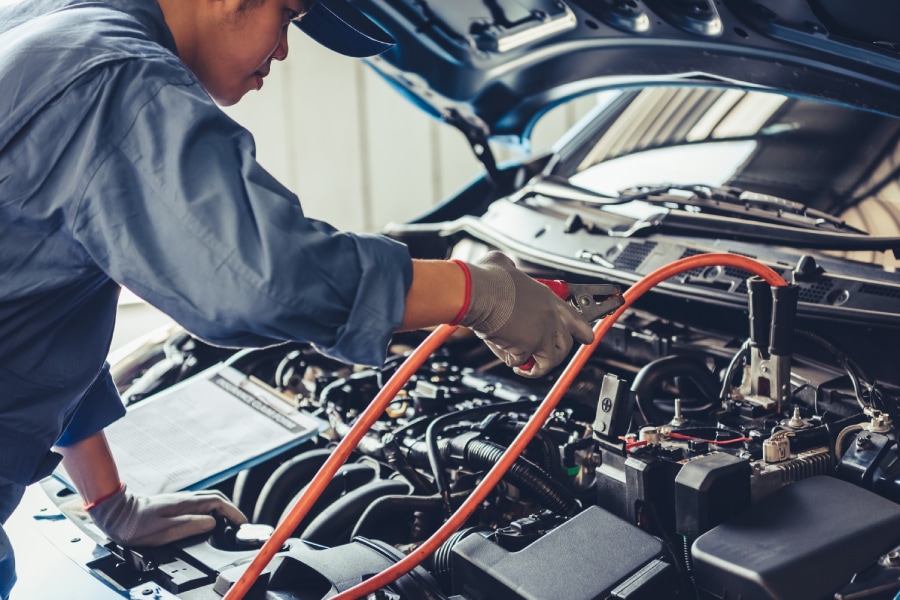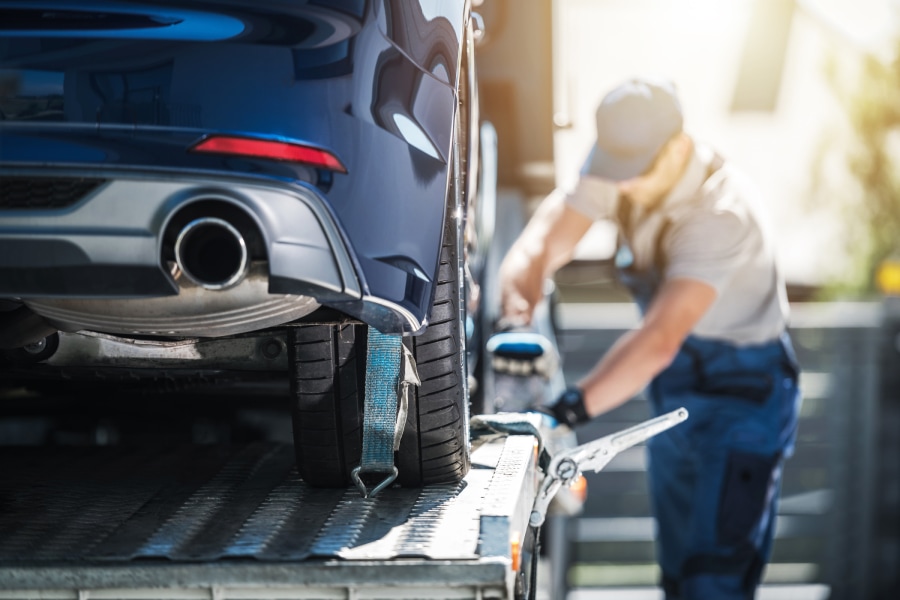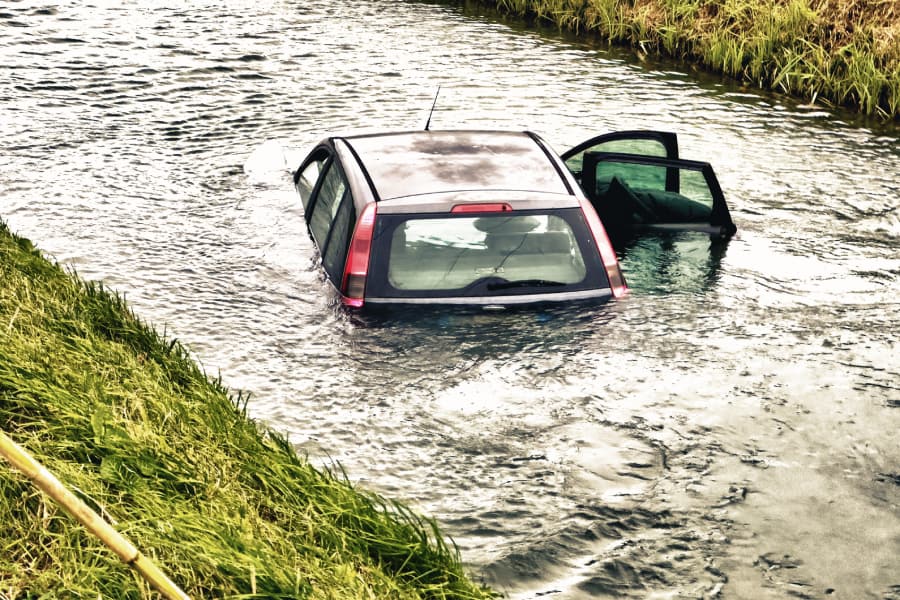Roadside emergencies such as flat tires and dead batteries are common occurrences for drivers. They can happen at any time and often when least expected. We aim to provide you with the knowledge and tools to handle these situations with ease and confidence.
We’ll start by discussing the most common roadside emergencies – tire troubles and battery blues. We’ll provide tips on how to handle these situations and get back on the road as quickly as possible. Most importantly, we’ll discuss staying calm during roadside emergencies and knowing when to call for Jacksonville roadside assistance and professional help from our Jacksonville tow trucks.
Flat Or Pierced Tires
Tire troubles are one of the most common roadside emergencies. A flat tire can happen due to a puncture, a slow leak, or even a blowout. Knowing how to handle a flat tire can save you time and stress.
The first step in dealing with a flat tire is to safely pull over to the side of the road. Once you’re safely off the road, you can assess the situation and decide whether to change the tire yourself or call for roadside assistance.
If you decide to change the tire yourself, it’s important to have the right tools. This includes a spare tire, a jack, and a lug wrench. It’s also important to know how to use these tools safely and effectively.
However, not all tire troubles can be solved with a simple tire change. In some cases, the tire may be damaged beyond repair and will need to be replaced. In these cases, it’s best to call for professional help.
Dead Batteries
A dead battery is another common roadside emergency. This can happen if you accidentally leave your lights on, if your battery is old and needs to be replaced, or if there’s an issue with your vehicle’s charging system.
If your battery dies, the first step is to try jump-starting your vehicle. This involves connecting jumper cables from a working vehicle’s battery to your dead battery. Once the cables are connected, the working vehicle can be started, which should provide enough power to start your vehicle.
It’s important to know how to safely jump-start a vehicle. This includes knowing where to connect the jumper cables and how to properly start the vehicles. If you’re unsure, it’s best to call for professionals
If jump-starting your vehicle doesn’t work, it may be a sign that your battery needs to be replaced. In this case, you’ll need to call for roadside assistance to have your vehicle towed.
Must-Have Roadside Tools
Having the right tools can make a big difference when dealing with roadside emergencies. These tools can help you handle minor issues on your own and can save you time and stress.
One of the most important tools to have is a good quality jack. This tool is essential for changing a flat tire. It’s also a good idea to have a lug wrench and a spare tire.
Another essential tool is a set of jumper cables. These cables can be used to jump-start your vehicle if your battery dies. It’s also a good idea to have a portable battery charger, which can provide a quick boost to your battery if needed.
Other useful tools to have include a flashlight, a first aid kit, and a roadside emergency kit. These kits often include items like flares, a reflective triangle, and a safety vest, which can be useful in case of a breakdown or accident.
Safety First in Roadside Assistance
Staying calm during a roadside emergency is crucial. It’s easy to panic in these situations, but keeping a clear head can help you make better decisions and handle the situation more effectively.
Once you’re safely off the road, take a few deep breaths and assess the situation. Try to determine what the problem is and what steps you need to take to resolve it.
It’s also important to stay safe while dealing with a roadside emergency. This includes staying in your vehicle if it’s safe to do so, and standing away from the flow of traffic if you need to get out of your vehicle.
Remember, it’s okay to call for help if you’re unsure of what to do. Roadside assistance services are there to help you in these situations, and they have the tools and expertise to handle most roadside emergencies.
DIY Vs Professional Towing
While it’s possible to handle some roadside emergencies on your own, there are times when it’s best to call for professional help. Knowing when to make that call can save you time and stress.
If you’re dealing with a flat tire and you have the right tools and know-how, you may be able to change the tire yourself. However, if the tire is damaged beyond repair, or if you don’t have a spare, you’ll need to call for a tow.
Similarly, if your battery dies, you may be able to jump-start your vehicle if you have jumper cables and a working vehicle nearby. But if jump-starting doesn’t work, or if there’s a more serious issue with your vehicle’s electrical system, you’ll need professional help.
Roadside Assistance Myths
There are many myths and misconceptions about roadside assistance. One common myth is that you must be a member of a roadside assistance program to get help. In fact, many towing companies offer pay-per-use services.
Another myth is that roadside assistance is only for major breakdowns. Roadside assistance can help with a variety of issues, from flat tires and dead batteries to lockouts and fuel delivery.
Some people believe that calling for roadside assistance will make your insurance rates go up. While it’s true that frequent claims can affect your rates, a single call for roadside assistance is unlikely to have a significant impact.
Finally, some people think you must wait for hours for help to arrive. While wait times can vary depending on the situation and location, many roadside assistance services strive to get help to you as quickly as possible.
Communicating with Your Tow
If you need to have your vehicle towed, it’s important to know how to interact with the tow truck professionals. These individuals are there to help you and treating them with courtesy can make the process go more smoothly.
When the tow truck arrives, be sure to provide the driver with all the necessary information. This includes your name, the make and model of your vehicle, and where you want your vehicle towed.
It’s also important to remove any personal belongings from your vehicle before it’s towed. The towing company is not responsible for items left in your vehicle.
Finally, be sure to thank the tow truck driver for their help. They’re providing a valuable service, and gratitude can go a long way.
Jacksonville Tow Trucks – Where Emergencies Find Peace
Roadside emergencies can be stressful, but with the right knowledge and tools, you can handle these situations with confidence. Whether you’re dealing with a flat tire, a dead battery, or a more serious issue, knowing what to do can make a big difference.
Remember, safety is always the top priority. Always pull over to a safe place, stay calm, and assess the situation before acting.
Don’t be afraid to call for help if you need it. Roadside assistance services are there to help you, and they have the tools and expertise to handle most roadside emergencies. You can rely on a reputable Jacksonville towing service to get you back on the road.
Remember that every driver experiences roadside emergencies at some point. It’s just a part of driving. But with the right preparation and response, these emergencies can be just a minor bump in the road.







